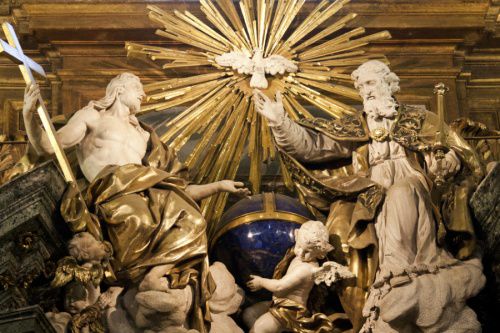In the revelation of the Holy Trinity, God shows the Church his selfless love and unity that we are called to foster in our own communities, Pope Francis said in his Sunday Angelus address.
“The Trinity is a communion of divine persons who are one with the other, one for the other, one in the other: this communion is the life of God, the mystery of the love of the living God,” the Pope said in his May 31 address.
Like the Trinity, “we are called to live not one without others, above or against others, but one with others and in others,” he said.
Francis spoke to roughly 50,000 pilgrims who were gathered in St. Peter’s Square to hear his address on the feast of the Holy Trinity, which the Church celebrates in honor of her teaching that there is one God expressed in three Divine Persons.
In his address, the Pope noted that it was Jesus himself who revealed the Trinity to us when he spoke of God the Father and the Holy Spirit, and when he referred to himself as the Son of God.
When he appeared to the disciples after he had risen from the dead, Jesus told them to evangelize, baptizing people “in the name of the Father and of the Son and of the Holy Spirit,” the Pope observed.
He explained that this “missionary mandate” didn’t end with the disciples, but has been passed on to the Church in every age.
The Church’s liturgical feast celebrating the Triune God serves as a moment of reflection on not only the “stupendous mystery” from which we came, but also of where we are going, the Pope said.
Since we were created by this God the feast is also a renewal of our mission to live in communion with God and with one another, Francis continued, explaining that this communion must be based “on the model of the trinity.”
The call to live both with and for others not only means welcoming and bearing witness to the beauty of the Gospel, he said, but is also a commission to live “in mutual love toward all, sharing joys and sorrows, learning to ask for and grant forgiveness, valuing different charisms under the guidance of pastors.”
“In a word, (God) has entrusted to us the responsibility of building an ecclesial community that will always be more of a family, capable of reflecting the splendor of the Trinity and of evangelizing not only with words, but also with the strength of the love of God which lives in us,” the Pope said.
Francis went on, saying that the Trinity is not only the source of our origins, but is also the final goal that our lives are directed toward.
“The path of Christian life is essentially a ‘Trinitarian’ path,” he said, explaining that the Holy Spirit is the one who guides us to full knowledge of the teachings of Christ, while Jesus, who came into the world to show us the Father, continues to guide us to him and to reconcile us with him.
“Everything in the Christian life revolves around the Trinitarian mystery and is accomplished according to this infinite mystery,” the Pope said.
He encouraged pilgrims to remind themselves that seeing the Trinity is the reason and “glory” that we continue to exist, work, struggle and suffer for.
Before leading those gathered in the traditional Marian prayer, Pope Francis pointed to Mary as someone who was not only loved and created by the Trinity, but who also serves as a concrete guide who teaches us how to see the signs of God revealed in the world.
He also prayed that she would intercede for the Church, so that it would always be “a hospitable community where each person, especially the poor and marginalized, can find acceptance and feel like a child of God, loved and desired.”
After reciting the Angelus, Francis noted that Bl. Fr. Louis-Edouard Cestac, founder of the Sisters Servants of Mary, was beatified May 31 in Bayonne, Francis.
Fr. Cestac’s witness of love for God and neighbor, he said, serve as a “new incentive” for the Church to live the Gospel of love with joy.
He also invited pilgrims to participate in a procession he will lead for the feast of Corpus Christi (the Body of Christ) this coming Thursday, June 4.
The Pope is scheduled to celebrate Mass at the basilica of St. John Lateran at 7p.m., and afterward will lead pilgrims in a procession of Eucharistic Adoration to the basilica of St. Mary Major.

